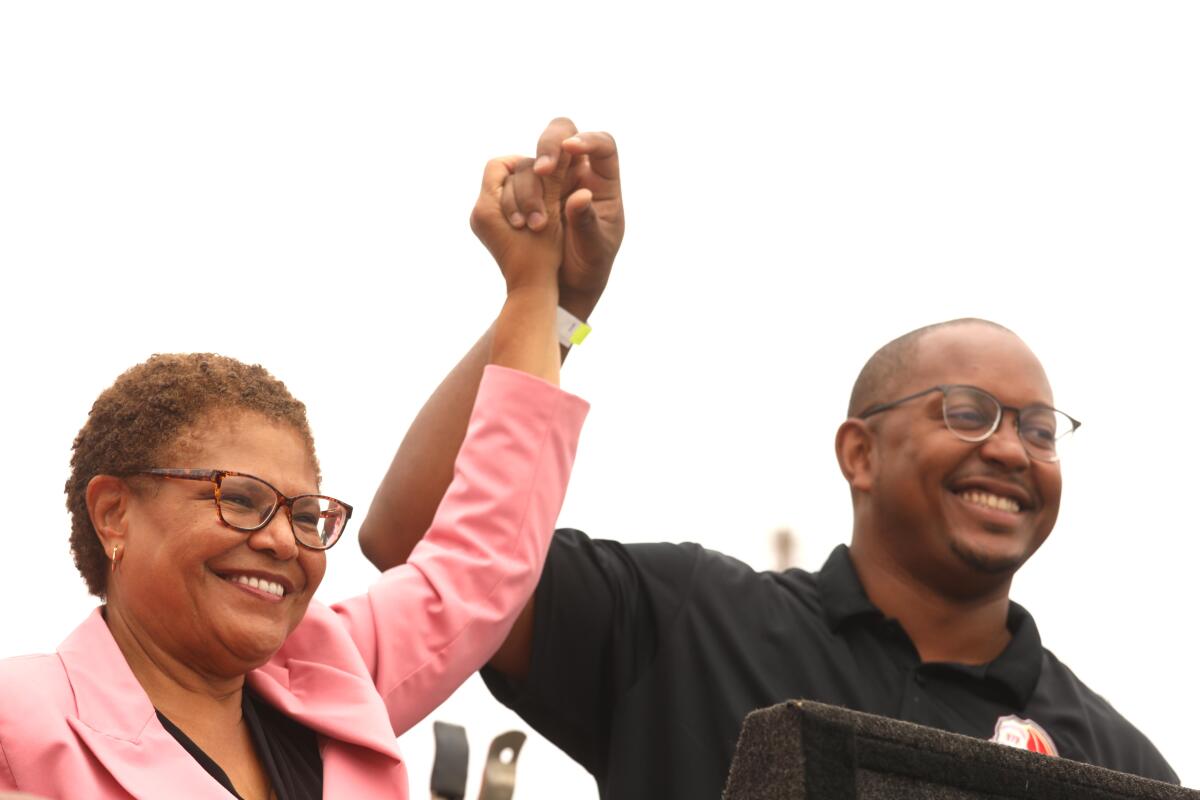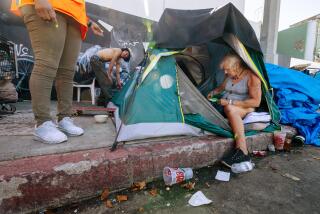Long Beach’s new mayor calls for state of emergency to tackle homelessness

Just hours after being sworn in, Long Beach Mayor Rex Richardson asked city officials Wednesday to draft an emergency declaration on homelessness, a move that he said he hopes will “get our unhoused neighbors off the street.”
“The crisis that we have requires us to move faster and with urgency,” Richardson told The Times in an interview. “This is our top priority.”
In a letter addressed to the city manager, Richardson and City Councilmember Mary Zendejas asked for the declaration to be presented to the council for its Jan. 10 meeting, allowing the city to move quickly and cut some red tape in hiring and procurement to address what Richardson said is a humanitarian crisis.
The move would put Long Beach in lockstep with Los Angeles, where just last week newly elected Mayor Karen Bass made a similar declaration, giving her the ability to create interim housing, dispense money to groups that reach out to homeless people, and cut red tape in regulatory and permitting processes.
“When L.A. thrives, our region thrives — we’re not confused about that,” Richardson said. “It can’t be just one city that makes it right. But if Long Beach and Los Angeles are aligned in values and focused on this issue, it will drive the region.”
Richardson first indicated his intention to ask for the declaration Tuesday after he was sworn in as Long Beach’s first Black mayor at an inauguration ceremony at the Terrace Theater. After his announcement, he recognized Bass, who attended the ceremony.
“That’s right, Karen Bass,” Richardson said. “I accept your call to lock arms with you and confront our city’s shared challenges.”
About 40,000 people are unhoused in Los Angeles. Bass recently announced a plan to move people from the streets to hotel and motel rooms, and said she plans to bring about 17,000 people indoors during her first year as mayor.
As powerful winds, rain and cold weather hit the Southland this week, the homeless here took shelter in area motels, thanks to a Los Angeles County program.
According to a 2022 report on Long Beach’s unhoused population, the seventh most-populated city in California has 3,296 people experiencing some level of homelessness. That is a steep increase of 62% compared with 2020, the last time the city conducted a similar report.
That included 1,282 people who were experiencing chronic homelessness, meaning they had been homeless for at least a year and have a disabling condition.
In the last year, Richardson said, 99 people in the city died on the streets before they were able to get help with housing.
“If we’d been able to get to them faster and get shelter up faster, I think we would have saved more lives,” he told The Times.
The pandemic and rising housing costs have worsened the homeless crisis, putting more families in economic peril and increasingly putting rent costs out of the reach of many people, the mayor said. The solution wouldn’t be quick, he said, but the urgency for action was immediate.
“This crisis is not going to be solved overnight,” Richardson said at his inauguration Tuesday. “It’s going to need much more than a six- or nine-month declaration of emergency. It’s going to require long-term housing solutions in the end.”
Richardson declined to give specific details but said he was working on compiling a team to address the emergency and has scheduled a meeting for later this week with city departments to tackle homelessness.
On Jan. 10, he also plans to unveil a 100-day plan. In the meantime, he said, his priorities were to increase shelter capacity, expand the number of teams that reach out to the city’s homeless population and finally deploy the city’s Alternate Crisis Response Program. Overseen by the city’s Health Department, the program is meant to deploy trained civilians to respond to nonemergency mental health crises that are not violent or require medical aid. Unveiled in March, the program has not yet been rolled out, Richardson said.
Recently the city has expanded to about 1,400 shelter beds, but Richardson said it will require more than just expanding the number of beds available at homeless shelters.
“Even if we put everyone in a shelter, that doesn’t break the lack of affordability that we have in every income level,” he said.
The city is working to purchase tiny homes and will reach out to nongovernment partners, such as religious groups and businesses, to look for other opportunities.
The new mayor pointed out the city recently obtained 600 housing vouchers but still has about 300 of them in hand because they haven’t been accepted by landlords.
“That’s an opportunity to find out what needs to happen to get our landlords involved,” he said.
He also plans in the coming weeks to draft and present a plan to the Southern California Assn. of Governments, which represents six counties and 191 cities. He declined to offer specifics on what that proposal might include.
As part of his efforts to address the issue, Richardson said the city would also be unveiling a new website Wednesday as a hub for resources and information about homelessness — a move he said was needed to educate the city about the crisis.
“We need every part of our city to go all in,” he said.
The mayor’s announcement comes four days after Richardson took part in a meeting at the White House with President Biden and a dozen other newly elected mayors to discuss federal partnerships to address public safety and housing.
After the meeting, the White House on Monday unveiled a plan calling on local governments to reduce homelessness 25% by 2025.
More to Read
Sign up for Essential California
The most important California stories and recommendations in your inbox every morning.
You may occasionally receive promotional content from the Los Angeles Times.











